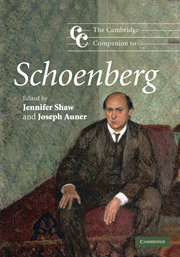Book contents
- Frontmatter
- 1 Introduction
- Part I Schoenberg's early years
- Part II Schoenberg, modernism, and modernity
- Part III Schoenberg between the World Wars
- 10 Schoenberg as teacher
- 11 Schoenberg, satire, and the Zeitoper
- 12 Schoenberg's row tables: temporality and the idea
- 13 Immanence and transcendence in Moses und Aron
- 14 Schoenberg, the Viennese-Jewish experience and its aftermath
- Part IV Schoenberg's American years
- Notes
- Select bibliography
- Index
14 - Schoenberg, the Viennese-Jewish experience and its aftermath
from Part III - Schoenberg between the World Wars
Published online by Cambridge University Press: 28 September 2011
- Frontmatter
- 1 Introduction
- Part I Schoenberg's early years
- Part II Schoenberg, modernism, and modernity
- Part III Schoenberg between the World Wars
- 10 Schoenberg as teacher
- 11 Schoenberg, satire, and the Zeitoper
- 12 Schoenberg's row tables: temporality and the idea
- 13 Immanence and transcendence in Moses und Aron
- 14 Schoenberg, the Viennese-Jewish experience and its aftermath
- Part IV Schoenberg's American years
- Notes
- Select bibliography
- Index
Summary
This chapter considers what made Arnold Schoenberg's participation in the culture of the Austro-German world possible, from the perspectives of a German-Jewish historical context and a theory of Viennese-Jewish identity. Taking a broad perspective requires a focus on matters larger than the individual. A simple reduction of Schoenberg's hyphenated Jewish identity to matters of personal belief, individual choice, or a facet of artistic expression would forgo too many questions that encompass the concerns of a people: a family history, a sacred text and law, a drive to be granted rights and recognized as fully human, an attempt to thrive in the majority culture, a desperation not to suffer annihilation, an opportunity to raise a family in a new country, a hope to help build a new nation. By virtue of their magnitude and urgency, these questions, vital to Schoenberg, help to place his work in a fitting context.
In a recent history of the German people, there is no mention of Schoenberg's name. The names that do appear, Bach, Handel, Haydn, Mozart, Beethoven, and Wagner, embody the narrative of a people who from a foundation resting on 200 years of German tradition (J. S. Bach), turned toward Enlightenment (Haydn and Mozart), a circumspect embrace of Utopianism (Beethoven), and an uneasy pairing of iconoclasm and German purity (Wagner). Though Schoenberg could have occupied a loosely defined space within the world of culture, as do Freud and Einstein, the fictional Adrian Leverkühn, the tragic protagonist of Thomas Mann's Doktor Faustus, displaces Schoenberg in this narrative.
- Type
- Chapter
- Information
- The Cambridge Companion to Schoenberg , pp. 191 - 206Publisher: Cambridge University PressPrint publication year: 2010
- 3
- Cited by



